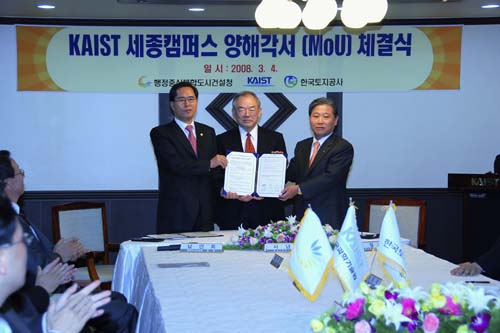policy
KAIST signed a memorandum of understanding (MOU) with the Multifunctional Administrative City Construction Agency and the Korea Land Corporation on March 4 to build a branch campus in the city now under construction to house many government organizations to be relocated from Seoul.
The MOU calls for building a well-facilitated KAIST campus on 310,000 square meters of land within the planned city, about 30 kilometers west of Daejeon. The multifunctional city, named Sejong City, is scheduled to be dedicated in 2014.
The MAC now being built in the Yongi-Gongju area of South Chungcheong Province is geographically in the center of South Korea, and many governmental agencies and major public organizations will move in from 2015.
The KAIST campus is envisioned to be home to a newly established College of Strategy and Policy, a Strategy and Policy Research Center, and an Innovative Technology Research Center. The College of Medical Science currently based in the Daejeon campus will be relocated to the campus. With a research-oriented hospital and a medical engineering research center, KAIST hopes to become a leading institution in disease treatment and medical engineering technologies.
The new campus is also expected to house new KAIST colleges now in the planning stage which will offer interdisciplinary courses such as the College of IT and Contents and the College of Life Sciences. KAIST also seeks to resolve housing shortage problems by building an in-campus village designed to provide international living environment for professors and students on the planned campus


-
event Formosa Group of Taiwan to Establish Bio R&D Center at KAIST Investing 12.5 M USD
KAIST (President Kwang-Hyung Lee) announced on February 17th that it signed an agreement for cooperation in the bio-medical field with Formosa Group, one of the three largest companies in Taiwan. < Formosa Group Chairman Sandy Wang and KAIST President Kwang-Hyung Lee at the signing ceremony > Formosa Group Executive Committee member and Chairman Sandy Wang, who leads the group's bio and eco-friendly energy sectors, decided to establish a bio-medical research center within KAIST and i
2025-02-17 -
research KAIST Develops Wearable Carbon Dioxide Sensor to Enable Real-time Apnea Diagnosis
- Professor Seunghyup Yoo’s research team of the School of Electrical Engineering developed an ultralow-power carbon dioxide (CO2) sensor using a flexible and thin organic photodiode, and succeeded in real-time breathing monitoring by attaching it to a commercial mask - Wearable devices with features such as low power, high stability, and flexibility can be utilized for early diagnosis of various diseases such as chronic obstructive pulmonary disease and sleep apnea < Photo 1. Fro
2025-02-13 -
research KAIST Uncovers the Principles of Gene Expression Regulation in Cancer and Cellular Functions
< (From left) Professor Seyun Kim, Professor Gwangrog Lee, Dr. Hyoungjoon Ahn, Dr. Jeongmin Yu, Professor Won-Ki Cho, and (below) PhD candidate Kwangmin Ryu of the Department of Biological Sciences> A research team at KAIST has identified the core gene expression networks regulated by key proteins that fundamentally drive phenomena such as cancer development, metastasis, tissue differentiation from stem cells, and neural activation processes. This discovery lays the foundation for dev
2025-01-24 -
event A heated battle of science and sports, who is the winner of this year's KA-PO War?
< Photos from KAIST-POSTECH Science War (photographed by Student Junhyeok Park of KAIST Freshman Course) > The future leaders of science at KAIST and POSTECH (President Seong Keun Kim) held their annual science and sporting event at POSTECH for two days from September 20th to 21st. The 'KAIST-POSTECH Science War (hereafter KA-PO War)' is a festival consisting of science and sports games and various side events to promote exchange and cooperation between the two universities. It is als
2024-09-19 -
event The 3rd Global Entrepreneurship Summer School (GESS 2024) Successfully Completed in Silicon Valley
The 2024 Global Entrepreneurship Summer School (2024 KAIST GESS), hosted by the Office of Global Initiatives under the KAIST International Office (Director Man-Sung Yim), was held for the third time. This program allows students to visit Silicon Valley, a global startup hub, to directly experience its famous startup ecosystem and develop their capabilities for global expansion. A total of 20 students were selected through applications, interviews, final presentations, mentoring, and peer evaluat
2024-07-03